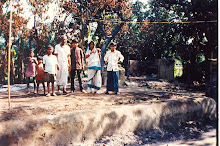Bangladesh Election Analysis
Asif Saleh; December 30, 08
The Guardian, U.K.
Two miracles happened in Bangladesh yesterday. Firstly, 80% of theBangladeshi electorate – a record number – voted in one of the mostpeaceful elections in the country's history. Secondly, they voted fora party that believes in secularism and by a majority big enough forit to control 85% of the parliamentary seats.It's a resounding endorsement of democracy and an emphatic victory forpluralism in the world's second-largest Muslim majority country.Although International media finds it easy to do a stereotypicalportrayal of the "dysfunctional two begums", the real story ofBangladesh, however, is in the details.In focusing so much on the two Battling Begums and the occasionalstories on Islamic extremism, the media tend to overlook the progressBangladesh has made under the two begums, its vibrant civil societyand its "dysfunctional democracy". Yesterday's election and itsoutcome is a continuation of that progress.What was even more remarkable in the election yesterday was the strongsignal sent to the political parties by the voters: reform or perish.They have abandoned the parties that ran a fearmongering campaign,used religion in politics and showed no intention to reformthemselves. On the other hand, they embraced the party that nominateda group of fresh politicians, talked about a vision of a pluralisticand developed Bangladesh and championed separation of religion andpolitics.However, those who expect an overnight full-scale reform will bedisappointed unless they accept that such reforms come through a slowand iterative process. They should take heart in the fact that theelectorate is aware and powerful and will not hesitate to obliterate aparty to send a message unless they change. No one found this out morepainfully than Khaleda Zia, the head of Bangladesh Nationalist Party,who failed to reverse the downfall of her party even after ahard-hitting campaign where she sought forgiveness from the public forpast mistakes.The public were in no forgiving mood, not only reducing its seats by90% but almost wiping out its alliance partner, Jamaat-e-Islami, whoseleaders have been accused of war crimes.Does this mean a new beginning for Bangladesh? That will depend partlyon how well the secularists can deliver beyond the rhetoric andcontinue the institution-building; and partly on army's staying awayfrom extra-constitutional intervention. Our dreams may be in for arude awakening in a few months like so many other times. But today, asBangladeshis, we are believers. We are daring to dream again.
http://www.guardian.co.uk/commentisfree/2008/dec/30/bangladesh
Subscribe to:
Post Comments (Atom)

No comments:
Post a Comment